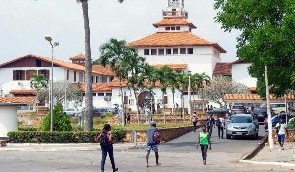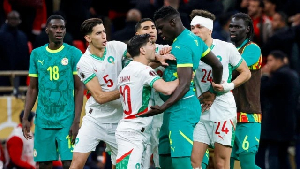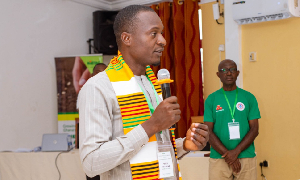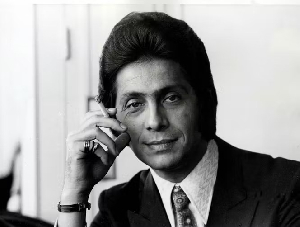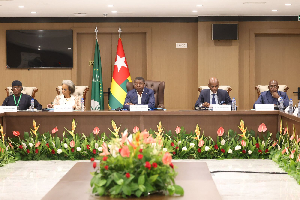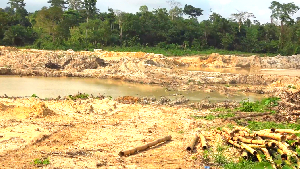Anytime we begin to think that we are moving forward as a country, disgraceful and opprobrious events remind us of exactly where we are as a people. The feebleness of the response from the appropriate authorities to some of these opprobrious events is, particularly, traumatic. Perhaps these events and the feeble response it procreates breathe realism into our aspirations as a country and leads to the realisation that we need to work even harder towards achieving our goals as a country and one people.
Alhaji Issa Mobilla's obviously violently violated mortal remains posted on the Ghana HomePage is one such disgraceful event that has reminded Ghanaians and stakeholders in Ghana of exactly where we are as a people. A picture, they say, speak a "thousand words". Somehow, it is hoped that the varied angles from which one could look at any given picture would average out the negative and positive aspects of that picture. Anyone who has seen the pictures of Alhaji Issa Mobilla's intensely breached mortal remains, I believe, could only possibly feel one thing. That is a deep sense of sadness and humiliation! And this deep sadness and humiliation aptly sums up the "thousand words" the pictures of Alhaji Issa Mobilla speak. Knowing the shameful story behind Alhaji Issa Mobilla's arrest and in whose custody he met his untimely death exacerbate that feeling. The political undertones underpinning his death further add to this deep feeling of sadness and humiliation. How could we as a people allow any one of us to die in this painful and unequivocally deplorable manner? Alhaji Issa Mobilla is a husband to a few, father to some, uncle to others, a friend and colleague to many. No matter what our political, religious, or social affiliations are, we would not want our loved ones to die in this despicable manner. Many questions have been asked about the apparent carnage in northern Ghana since the barbaric murder of the late Ya Naa and forty (40) of his associates. Many more have been asked since the apparent torture and subsequent murder of Alhaji Issa Mobilla. The country's leaders and authorities have allowed these questions to linger on and pile up and have not even begun answering the most basic of them. Is there anybody taking responsibility for anything here? Why are we, as a people, seen to be doing nothing about these deaths especially as there is a seeming spoor of political murders in northern Ghana?
It is indeed sad that the traits of political murders in our nation-state, although occasionally dormant, still seem to be an active character in the body of our national politic. More disturbing at this moment in time is the randomness of political murders in the northern part of our nation-state, which started with the brutal and barbaric beheading of late Ya Naa and the slaying of forty (40) of his associates. As has been widely reported, many protuberant citizens in Northern Ghana are afraid, rightly or wrongly, for their lives because of their political affiliations. It is no secret that these outlandish murders in the northern part of Ghana in recent times have been lively when the National Patriotic Party (NPP) have been in power. That is not to politicize the issue(s) of these murders or blame the NPP for the murders. It is a fact and the actions, by way of how these murders have been investigated or being investigated, of the leadership of the NPP in government and the relevant authorities has not inspired any feeling of confidence in the citizenry of Ghana, and Northern Ghana in particular. To illustrate, the President, Mr John Agyekum Kuffour, stated in an interview he granted to the BBC last year that he saw the brutal slaying of Ya Naa and his associates as a "traditional problem". Hence his approach has been to assemble so-called "prominent chiefs", with no real authority outside their areas of authority, to address this "traditional problem". Many would say, of the Presidents approach, that it is a wanton display of degrading a heinous criminal act. Is it any wonder that not a single person has been arrested and prosecuted for this shocking display of human butchering? Who else but Mr John Agyekum Kuffour will tell the world that murder of over 40 people could be left to traditional chiefs to solve?!? The reasoning behind the President's view that the traditional chiefs, without any real authority in criminal matters, could be lynchpins around which murders could be solved beats the imagination of many in our society. Secondly, a man who as a Minister of Interior at the time the late Ya Naa and his associates were murdered took no responsibility for his failing to protect the murdered citizens has now been elevated by the ruling party, NPP, to a Deputy Speaker position of our national assembly. The fact that he was even nominated for such a position is bad enough and disrespectful to many Ghanaians far and wide. We have learnt that there was information at that time, which this person could have acted on at the very least, to stop this monstrous and shocking crime. He did not act and have since not taken any responsibility for his incompetence and apathetic behaviour. Now with a thundering sound he is a Deputy Speaker in Parliament! This elevation suggests, among many others, a positive boon to shocking international display of incompetence and apathy. These two cloudless instances begs the question; does the seeming political blood letting in northern Ghana really disgust the president and his associates?
The "northern murders", are, indeed, political. Introspection and self-examination leads to this conclusion. All those who belong to the political body of seeing justice done need to stand up, speak out, and be counted. The failures of the processes set into motion as a result of these murders are self-evident. These failures have, implicitly, impugned those very processes. Competent investigative authorities with real powers, not traditional chiefs, need to given the free hand to do the right thing here. All peace loving Ghanaians also need to exert pressure and maintain that pressure for these "northern murderers" to be brought to book. Delayed justice here would be slowly providing noiseless impetus to murderous minds to carry through their intentions. Again, we need to be mindful of our past and not give an excuse to any group to violently change the political order.
The President is happy to travel around and claim $3000 or so per day to help solve the "Ivorian crisis". He may as well take a cue from the Northern-Southern divide in Ivory Coast and how perceived injustices, real or imaginary, got the country where they are today. There is an even bigger crisis, on the president's hands, persisting in his own country. If he fails to adequately address this crisis involving the right to life in his own country, there may not be much left of the country over which he could claim to be the president. At the very least his, and possibly those coming after him, authority will be totally eroded in certain parts of the country. Justice was done in the murders of the three high court judges and the retired army officer. Justice must be done with the "northern murders". The Ya Naa, Alhaji Mobilla, and all the other murdered people in the northern part of Ghana, some of whom are not properly laid to laid, are also citizens of Ghana and deserve the same thorough and competent investigations. This would go a long way in forestalling political torture and murder among our citizenry.



